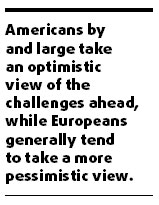To believe, or not to believe in recovery
Optimism versus pessimism is a key element in the debate over the paths leading toward global economic recovery. But while China is looking ahead with some optimism, what about the sentiments of two of its biggest trading partners: the European Union (EU) and the US?
After Barack Obama was sworn in as America's president, the US and the EU have in many ways moved closer in terms of economic and social policy concepts, and three factors are primarily responsible for that.
The first is the EU trend over the past two decades to emulate more of the market-based approach of the US. The second is the strategic preference of the Obama administration to strengthen consumer rights, while getting tough with corporations. And the third is the fallout of the economic recession, which has forced US policymakers to opt for considerably more state spending to support the rather weak social security and provide financial aid to ailing companies and industries.
But one basic difference between the US and the EU remains as pronounced as ever: Americans by and large take an optimistic view of the challenges ahead, while Europeans generally tend to take a more pessimistic view.

This basic difference in attitudes matters a lot because it has a significant effect on the global economy. With unemployment at a 25-year high, media and market experts are looking feverishly for signs of a turnaround. Larry Summers, director of the National Economic Council and a top US economic strategist, seems to have a special knack for coming up with a steady supply of new inspirational analogies to boost Americans' confidence and to position the country for an economic turnaround.
The EU, on its part, feels caught in a trap. After initially believing it would escape the "made-in-America" financial crisis - a rare moment of European optimism - the EU realized the economic tsunami had hit its member-states' economies with a vengeance. Hence, it is being criticized for failing to recognize the depth of the economic crisis and for playing catch-up with everything, from the size of stimulus packages to interest rate cuts.
Why do these differences in economic sentiments and society-wide response mechanisms matter? Ultimately, it's all about bond markets. On both sides of the Atlantic, a key concern is to secure financing for what are bound to be very large bond auctions to deal with the consequences of a severe recession. There is a growing nervousness among officials of finance ministries of all major countries, and investors are concerned over the size of those auctions, future economic growth prospects and the comparatively low interest rates being offered for long-term obligations.
Given the quite rosy growth forecast for 2010 - and in light of the 2010 mid-term elections - the Obama administration wants to turn public sentiment toward more positive thinking on the economy. But it has been taking great care not to appear too optimistic.
The experience of recent years has made the US administration painfully aware of the danger that an abundance of optimism can be detrimental to the nation's economic performance. With the benefit of hindsight, few people now doubt that the main reason behind the economic crisis is that key sectors turned blindly optimistic.
So let's assume SUVs could carry the US auto industry forever and giving home mortgages to people without the financial means to buy houses would sustain the US housing industry.
On that front, we Europeans usually do a better job. Given our general penchant to be doubtful, it is very hard for us to ever be more than guardedly optimistic.
Looking ahead, a key question in the global economy is whether Americans will preserve their customary sense of optimism. Viewed from a household perspective, doubts seem to be warranted. Americans are over-indebted, incomes have stagnated, the infrastructure is astonishingly weak, given the country's overall wealth level. There are but a few examples.
In addition, the rise of China, India, Brazil and other large nations is increasingly viewed as stunting the economic growth potential of the United States because the growth dynamics are shifting to other continents.
On the other hand, despite all the shortcomings - and the steep costs associated with the current financial crisis - even the large budget deficits that are now on tap for years to come must be kept in proper perspective. Many of the reforms now underway in the US (such as in the healthcare sector, the financial industry, the infrastructure sector), are bound to raise the efficiency of the US economy over the medium and long term.
International investors are looking at a country where a stalemated political process had put meaningful domestic reform on hold for quite some time. Moreover, the European experience indicates that smartly structured benefit levels can indeed improve a society's productivity level.
Workers will be more productive if they do not have to worry gravely about having adequate health insurance. Likewise, a more diversified transportation infrastructure, including high-speed trains, improves the quality of life - and the nation's productivity.
This is why US policy makers seem justified in focusing on strengthening the somewhat shattered roots of American optimism. And that is something that matters far beyond America's borders.
In the ultimate analysis, this optimism - if properly and realistically applied - may turn out to be the most redeeming and vital American virtue in the concert of nations. As we would painfully learn only in its absence, it is a global public good of the highest order.
The author is president of Berlin-based DIW (German Institute for Economic Research).
(China Daily 06/11/2009 page9)














